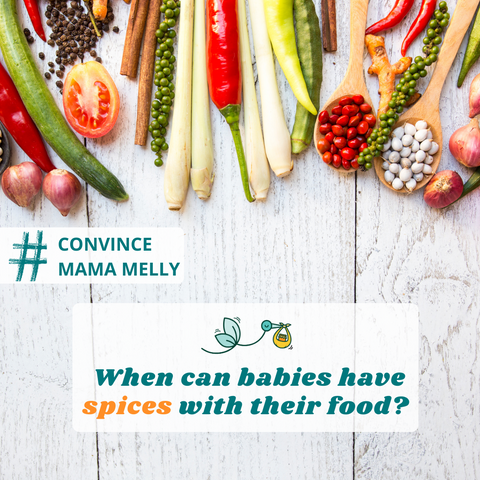When baby begins their solid food journey, which is often from the age of 6 months, herbs and several spices can be introduced.
Avoid seasoning their meals with salt or sugar.
- When can babies have spices with their food?
Your baby should become accustomed to foods that aren't too salty or too sweet.
- Benefits of introducing spices early on:
Enhance the flavor and smell of food
Evolve baby's palate as they are more willing to experiment with new flavors
Help baby transition to family food
May help reduce picky eating
- How to introduce spices to your baby
Introduce one spice at a time when incorporating spices into your baby's diet. When preparing meals with spices at home, feed your baby what the rest of the family is having. Your little one might enjoy nutmeg in fruity mixes, or cumin and paprika in savory ones.
- Spices you should start with:
For Savory Meals
- Cumin
- Paprika
- Thyme
- Turmeric
- Ginger
For Fruity Meals
- Cinnamon
- Nutmeg
- Cloves
- Cayenne Pepper
- Chili Flakes
- Salt
- Sugar
Make sure to avoid anything that is spicy as it may irritate baby's tummy, but note that some babies won't have any issue with cayenne and chili, especially if they have already been introduced to them through their mom's diet.
Note that..
Introduce small amounts of spices and build up the quantity over time since spices tend to overpower the taste of food.
Be persistent: babies need lots of trials while tasting something new, so don’t worry if they don't like them straight away.
It's preferable not to offer spices in every meal. It's good for babies to get used to all types of meals: unflavored, herbed, lightly spiced...
Make your OWN spice blends
- Savory Spice Blend
1 tsp paprika
1 tsp ground coriander
A pinch of cumin
2 chopped garlic cloves
- Sweet Spice Blend
2 tsps ground cinnamon
1 tsp ground cloves
1 tsp ground ginger
1 tsp ground nutmeg
1 tsp ground allspice



